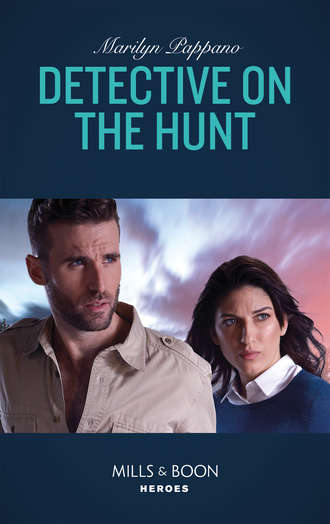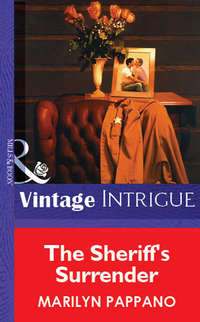
Полная версия
Detective On The Hunt
As if any cop who cared about his job would honestly answer that question from a stranger. Sam was damned good—Quint wouldn’t have a job if he wasn’t—but if the truth was one of the other two answers, no way he’d admit it. “Good.”
He thought he heard a sigh from her in response, but when she didn’t respond, he turned his attention to the police station ahead of them. The building was three stories, constructed of huge blocks of sandstone, with broad concrete steps leading to the double doors. More than a hundred years old, its purpose wasn’t just function; it provided beauty and solidity, elegance and grace—a quote from the city’s tourism brochure. It had been built to last, and it gave him a sense of…
He wasn’t sure how to identify the feeling. He’d spent sixteen months learning to ignore feelings, and it was hard, once a habit formed, to give it up again. Satisfaction wasn’t quite the right label. Neither was comfort. Security, maybe. It had stood there strong and whole his entire life, and it would still be there, strong and whole, long after he died. Unchanging. Constant.
They stepped onto the curb, walking between flower beds planted with hardy petunias, when JJ broke her silence. “Just for the record, I’m armed.”
He stopped. So did she. He wasn’t surprised. Most cops he knew didn’t go anywhere without some form of weapon. His surprise was that he hadn’t thought to ask her. Now he faced her, his gaze focused tightly as it moved down, then back up her body. Almost immediately, he spotted the slight bulge beneath her jacket on the left side indicating something holstered there, but he didn’t assume it was the only weapon.
Her white shirt was fitted, hugging her breasts and stomach, and couldn’t have concealed a thing. Her jeans, faded soft blue and showing signs of long-term wear, were snug over her hips and clung to her muscular thighs and calves, all the way down to the brown leather boots peeking out from beneath the hems.
Nothing special, he reminded himself.
“What is it?” he asked with a nod toward her caramel-colored suede jacket.
She pulled back the left side to reveal the black-and-yellow Taser holstered grip forward on her waistband. An easy position to draw from for a right-handed person. No doubt she normally wore her pistol on the right. No chance for a mix-up unless a person was an idiot.
“Is that all?”
A smile crinkled her eyes. “Where could I hide anything else?” Then a nod toward the Challenger. “My weapon’s locked in the car.”
Confirming what he suspected: JJ Logan was in Cedar Creek on a job—the reason Sam had sent him out to retrieve her in the first place. Sam liked to know what was going on in his town. Quint…he didn’t care that much anymore.
“Should I leave the Taser in the car?”
Quint shook his head. “Everyone inside is armed, too. You’re not a threat.”
She gave him a look halfway between hurt and insulted. “Don’t be so sure of that. You don’t even know me yet.” Smiling, she began moving again, reaching the bottom step before he gave himself a mental shake and followed.
He knew one thing: he didn’t want to know her. His life was steady. Predictable. Not happy, but the normal that had been forced on him. He didn’t need any upsets to his routine. He was going to deliver JJ Logan to Sam’s office, go back to his vehicle, forget he’d met her and get back to work. Back to the solitude he preferred.
Maybe not actually preferred, but had chosen. Or had it chosen him?
You can’t change the world, someone had told him, but you can change the way you react to it. And he had changed the only way he knew how. No reactions whatsoever. If he didn’t lose control, then he didn’t have to struggle to regain it.
JJ reached the double doors before he did, opened one and stepped back so he could enter first. It didn’t bother him. In Cedar Creek, courtesies like that weren’t assigned by gender. Whoever was there first did the honors, and sooner or later the honoree would do it for someone else.
She stopped a few feet inside the door to look. He was in and out of here five or six times a day. He rarely noticed the furnishings anymore, but JJ certainly did. The lobby was marbled, high-ceilinged, chandeliered and grandly staired. Behind the gleaming wooden counter, though, the ceiling had been dropped to a regular height with ugly acoustic tiles, and so much furniture had been crammed in that there was little breathing room.
Quint used to have his own office. Now, in the event he needed a desk, he used one of the two unclaimed ones against the back wall. One had two uneven legs, and the other was so scarred on top that it was impossible to write legibly without borrowing a solid surface from elsewhere.
The chief’s secretary, Cheryl, looked up and over the top of her glasses. “Sam’s in his office.”
Quint acknowledged her with a nod, seeing that everyone else was looking at them, too: Daniel Harper and Ben Little Bear, two of the detectives who’d once answered to him; Morwenna Armstrong, dispatcher and coqueen of local gossip along with Lois Gideon, their first female and first turquoise-haired officer; and three other patrol officers checking in for something or other. Quint knew they were interested in the visiting detective, not him, but bitterness stirred in his gut anyway. That sourness—regret or, more likely, shame—made its presence known damn near every time he came into the station.
He gestured to the hallway this side of the staircase. Too narrow to be called a corridor, it had been chopped out of other spaces and just barely allowed two people to pass without bumping shoulders, and that was only if one of them wasn’t Ben Little Bear. It was lighted by cheap ceiling fixtures circa the ’70s, and two of the four had burned out. Waiting for someone else to do something about them hadn’t worked, so maybe Quint would drag out the ladder before he went home today and change the bulbs. It was something to do.
Something to put off that moment of pulling into the driveway of his and Linny’s house. Of climbing the steps knowing the house was empty. Of opening the front door and walking into a space where her fragrance didn’t sweeten the air, where her laughter didn’t ring, where her presence was insubstantial.
The first door down the hall opened into Sam’s office. Quint rapped a little sharper than necessary, feeling the sting in his knuckles, then opened the door. He’d radioed in when he parked outside, so Sam was expecting them. This time, Quint stepped back and let JJ enter first. “Chief Douglas, Detective Jennifer—”
She cleared her throat.
“Detective JJ Logan,” he finished. “I’m headed back out—”
“Come on in, Quint. You should probably hear this.” Sam rose from his desk and shook hands with JJ, then directed her to one of two chairs in front of his desk.
Quint stiffened. No, he shouldn’t probably hear this. Whatever JJ was doing in Cedar Creek couldn’t have anything to do with him. Sam—he needed to know. Little Bear, Harper, the other detectives—they might need to know. But Quint was just a patrol officer. He wrote tickets, broke up brawls, handled domestic disputes. He didn’t need to be in the loop on the important stuff any more than the newest rookie out there did.
But he wasn’t about to argue with Sam, especially in front of a stranger. Reluctantly, he pivoted back into the room, closed the door and, ignoring the empty chair, leaned against the edge of the table butted up to one wall. It gave him a good head-on look at his boss, with only a peripheral view of JJ.
“I bet you got a call this morning from South Carolina,” she said pleasantly.
“I did,” Sam agreed.
“From Chief Chadwick?”
“It was.”
Though JJ’s tone hadn’t changed when she spoke her boss’s name, something about it, or about her, reminded Quint of the question she’d asked out front. Is your chief good, bad or indifferent? Not idle conversation, then. His intuition was willing to bet that she put Chadwick as squarely in the second category as Quint put Sam in the first. Personality conflict? Professional differences? Was Chadwick a bad chief, was JJ a bad cop or did the truth fall somewhere in the middle?
That feeling rousing in his gut felt vaguely like curiosity, maybe even plain old interest. How long had it been since he’d been interested in anything?
Maybe he’d been wrong outside. Maybe he did want to know more about JJ Logan.

JJ tried to not let her nose wrinkle with distaste at Chief Douglas’s last answer. She’d known Chadwick couldn’t be trusted. If she told Douglas—and the handsome Officer Foster—that Chadwick had specifically told her to not touch base with them, she would seem petty or defensive. Besides, no cop bad-mouthed her chief to cops she’d just met. That would be a big step toward giving Dipstick the reason he needed to fire her.
So she put on her best trust-me face—a smile that was neither over-nor underwhelming, her gaze clear and steady—and added a bit of sheepishness to it. “I really did intend to come by later today. I was just eager to get to work.”
“Work,” Chief Douglas repeated. “What’s your interest in Maura Evans?”
Had Chadwick told him the truth about that or tried to screw her there, too? Was she going to tell her story only to find his had been totally different and thereby look like an idiot—worse, an untrustworthy idiot—in front of these fellow officers?
Nothing she could do but be honest herself. If the boss had muddied things between her and the local department, she would just have to make the best of it.
“Maura’s a local girl. She left town a few years ago after her parents’ deaths. She’s twenty-five, single, still grieving…and very wealthy. She settled here in Cedar Creek about six months ago and, three months later, cut off contact with everyone back home—friends, relatives, the family attorney who also happens to be her godfather. He wants to know what’s going on with her.”
She saw a flicker of expression—negative—cross Officer Foster’s face, making it easy to guess what he was thinking. Spoiled rich girl, selfish, entitled, the center of her own universe—her influential lawyer godfather taking advantage of the system, the chief giving in to political pressure to treat Maura as if she were special.
It was harder to tell with his chief, though. Douglas’s expression gave away nothing, and neither did his tone. “Your department must be blessed with detectives—and funds—if they can send one halfway across the country to do a welfare check on one of our residents.” Then came a faint whiff of disapproval. “A check that we would have happily handled for you if you’d just called.”
Her smile thinned. Hey, she wasn’t onboard with this, either. She had much more important cases she could be working on, cases where there was actually a police interest. “Did I mention that the town Maura Evans left is named Evanston? The Evans family have been rich and powerful since they founded the town in 1804. They donated land, set up charities, ran businesses, built schools and libraries and churches and hospitals. The men were war heroes, and the women were social workers ahead of their time. They are one ridiculously wealthy family that everyone in town respects and cares about.”
She hesitated, then corrected herself. “They were. Maura has distant relatives, but she’s the last one in the direct line.” People would have treated her like their greatest, most fragile treasure if she hadn’t fled town after the funerals. But no one blamed her for that. How could she have stayed in that town with its all memories, in that house knowing…?
With a suppressed shudder, JJ shifted her gaze to Officer Foster. Quint, the chief had called him. She liked the name. It was neither overly common nor trendy nor so unusual as to be unspellable, unpronounceable or unmemorable. “I really was just having a look around out there this morning.”
His only response was the smallest of shrugs. The chief, on the other hand, raised one brow. “That’s what you call surveillance back in South Carolina? Having a look around?”
“All right, yes, I parked down the street from her house this morning for fifteen minutes…maybe thirty…maybe an hour.” She couldn’t resist a rueful grin, the one her sisters called her mischief grin. Standard when she’d been caught with the cookie jar in her hands and chocolate chips smeared across her face, saying, Yes, I’m guilty, but I’m just so darn adorable, you have to forgive me for it. Dad always had. Mom usually had. She achieved varied success with others, and it looked like none whatsoever with Quint Foster.
Aw, she’d really like for him to find her adorable. If not him… She remembered the other officers she’d seen when they’d come in. Good-looking, every last one of them. Hopefully, between work, she’d manage some play on this trip, too.
“Along with a pair of binoculars, a map of the city, a camera, a large cup of coffee and an empty bag from Ted’s Doughnuts.”
JJ was impressed that Quint had been so observant. With those dark glasses he’d had on, of course, she couldn’t see where his gaze was directed, but it had felt as if it was on her the whole time. Obviously not.
“Didn’t take her long to figure out where the best doughnuts in town are, did it?” Douglas murmured.
Though the comment wasn’t directed at her, she responded with a little shrug. “Cops and doughnuts. What can I say?”
He smiled briefly at the stereotype, then opened the laptop and began clicking away. She’d never had a chief who was anywhere near her age, but she would bet Sam Douglas was even a few years younger. He didn’t wear a uniform—Chadwick always wore a uniform with four shiny gold stars on his collar to ensure everyone recognized him as the head honcho—but instead was dressed in jeans and a button-down shirt. A soft-looking gray cowboy hat was on the file cabinet to the left of his desk, leading her to expect cowboy boots on his feet if she could get a peek.
You’re definitely not in Carolina anymore, JJ.
“Okay, Detective Logan—we don’t stand on ceremony much around here. All right if I call you JJ?”
She nodded.
“I’m Sam, and he’s Quint.”
Wow. She’d never had a chief who was that casual, either. Even the last one, her mentor, had never invited her to use his first name. He’d believed in good work relations, but there was a line that should never be crossed.
“You didn’t ask what we know, but we’ll tell you anyway. You have the address of the house Maura’s renting. You know she drives a little red car that cost more than a lot of people’s houses around here. I’ve never met her myself, but my officers have handled four disturbance calls at that address for loud parties and given her three—no, four citations for speeding.”
Disturbance calls at that big house at the end of that lonely street. Those must have been some parties.
“Quint gave her three of those tickets.”
She shifted her gaze to Quint. He hadn’t changed position—he still leaned against the table—but his posture seemed fractionally more rigid, his expression harder. She was half surprised he could open that taut jaw to add, “I also answered one of the disturbance calls with Ben.”
Sam frowned. “Why was Ben answering a disturbance call?”
“He was in the office when it came in. Loud party, forty or so people, lot of booze.”
JJ called to mind the area across the hall that served as reception, dispatch and detective squad, including a very tall, very broad-shouldered muscular man. “I’m going to guess Ben is the big guy out there at one of the desks.”
Sam nodded. “Six foot four, solid muscle, can make you confess to anything just so he’ll go away and stop looking at you. No matter how drunk people are, they never want to take on Ben Little Bear.”
She envied that. When she was in uniform, all the drunks had wanted to take her on. She’d been forced to perfect her combat skills and had developed quite an affection for her nonlethal resources: baton, pepper spray and Taser.
“When was the last time you saw Maura?” Sam asked Quint.
“The day I gave her that last ticket.” Quint’s scowl was slightly more fierce than his normal expression. “About two months ago. She was doing forty-eight in a twenty.”
JJ smiled faintly. “That sounds like Maura. The day her parents gave her that car, she got stopped for speeding in town and again in the county. Notice I said stopped, not ticketed. The officer and the deputy let her go when they realized who she was. I wrote her father a ticket once. Got called back to the station and royally chewed out.”
“Must be nice to have so much influence.” Cynicism made Quint’s voice dry as parched sand.
“I can live without it.” She crossed her legs and let her foot tap air a few times. “At home, we have a dispatcher named Carla and a patrol officer named Patrick who know everything there is to know about everyone in town.”
Quint and Sam exchanged looks before the chief answered. “That would be Morwenna and Lois. Quint, why don’t you show her the conference room and I’ll get them.”
Quint straightened to his full height easily and fluidly. She, on the other hand, felt the stiffness of two days’ driving and another few hours’ sitting. While she was here, she needed to make time for regular runs, long walks or—her gaze slid from his golden hair over his chest, his narrow waist and narrower hips, down long legs to the black tactical boots he wore—ah, yes, physical activity of some sort.
Without realizing it, she’d registered at some point that, unlike Sam, he wore no wedding ring. She had only two hard-and-fast rules in her romantic life, and one was that she didn’t dally with married men. She’d pulled enough enraged wives off their husbands’ girlfriends, hands filled with hair and fingernails leaving deep gouges, to know the best sex in the world wasn’t worth that.
The other rule was that her butterflies had to twirl and her heart had to pitter-patter.
Check on the butterflies. And—she caught the slight increase of her heart rate—check on the pitter-patter.
But what were the odds she’d be here long enough to thaw him out?

Showing JJ to the conference room took about five seconds: out the door, turn right, go to the next door. Quint flipped on the overhead, then went to open the blinds on the tall windows. The light flooding the room illuminated the intricate crown molding, original to the building, along with the battered table, cast-off chairs and unwanted desks bunched against one wall.
“Interesting room,” she remarked as she made her way to a chair. “The marble floor is gorgeous, and the moldings are incredible.”
“But everything in between sucks.”
“Except for the windows, pretty much.” She sat at the far end, where sunlight filtered through the blinds. The position would give her a good look at everyone else while she would be shadowy when they looked back. He bet she had all kinds of similar tricks up her detective’s sleeve.
He should ask Sam if he could go now, but Sam hadn’t included that in his instructions. For whatever reason—probably because Maura lived in Quint’s patrol district—he wanted Quint to know all this, and because Quint was damn grateful to have his job, he was going to obey. But he’d still rather be outside, alone in his vehicle, with nothing for company but the radio broadcasts.
JJ’s chair was pushed back from the table, leaving her room to cross her legs again. Her spine was straight, barely touching the back of the chair, and except for the heavy jacket, her clothing clung, shirt hugging her breasts just short of straining the buttons, denim stretching over her thighs. Most women he knew with that kind of posture had suffered through years of ballet or gymnastics. He tried to imagine her in leotards or tights, tumbling or pirouetting on her toes, but the image wouldn’t form. Swinging a baseball bat or breaking a board with her bare foot seemed far more likely.
She brushed her hair back, and sunlight flashed on a stone on her left hand. It was on her ring finger, fiery orange set in gold. A nontraditional engagement or wedding ring, or just a piece of jewelry she liked? He wouldn’t find it hard to believe she was unconventional. Wouldn’t find it hard to believe she was married, either.
Didn’t matter to him either way.
“What is your impression of Maura?”
Embarrassment heated Quint’s neck but luckily burned inward instead of out. From the moment the dispatcher had passed on the call to check the stranger on Maura’s street, he’d known in the back of his mind that this had to do with Maura. Who else on that street was interesting enough for surveillance? The young couple with four kids in the house fifty feet behind where she’d parked? The elderly sisters? The two college girls down the street or Jamey Moran, the deputy fire marshal who was so clean he squeaked?
But the front part of his brain hadn’t wanted to give it any thought. Now he had no choice, so he gave the most superficial answer that came to mind. “She’s a bad driver with too much time and money on her hands.”
JJ tilted her head to one side. “That’s it?”
Acknowledging that he seemed to be getting further away from returning to his vehicle instead of closer, he swallowed a sigh and took a chair near her end of the table, leaving an empty space between them. “I don’t know her. My interaction with her has been less than thirty minutes, all calls combined.”
That was true. But he was leaving out the fact that the last time he’d stopped her, Maura had offered to remedy the not-knowing-each-other thing if he wouldn’t write the ticket. He’d stood there in her driveway—she’d refused to stop until she reached the house—and smelled the sweet scent of her perfume, watched the breeze mold her already-tight dress even closer to her body, and sweet hell, he’d been tempted. He’d been alone so long. So damn alone. Sometimes he’d missed human contact so much that he’d physically hurt with it, and he’d thought…
It had shamed him then, and it did now. He’d thought Maura was no one special. She would never mean anything to him. He could use her to ease his pain and never have to bother with her again. He’d never treated women as disposable, but it had held a strong appeal that day.
Then she’d touched him, and it had had the effect of a gut punch, slamming home one important truth: he didn’t want human contact. He wanted Linny. No one could ever replace her, not for a night, for an hour or a minute, and certainly not some rich girl who thought avoiding a hundred-dollar ticket was worth trading sex for.
Disgusted with himself, he’d removed her hand, a bit of a struggle when she’d already insinuated her fingers inside his belt and didn’t want to let go. She’d pouted, called him a few names, torn up the ticket and let the wind scatter the pieces. And after that, he’d turned a blind eye to her driving infractions, just like those South Carolina cops did. Don’t poke the bear, his father used to say. The next time he might not walk away with his dignity intact.
“She was self-centered. Used to getting her way. She fluttered her lashes and smiled real pretty and expected problems to go away. I have no idea why she settled here. There aren’t a lot of restaurants, no clubs that would appeal to someone like that, no shopping besides Walmart, a couple of small clothing stores and the antique stores downtown, and name-dropping wouldn’t get her anywhere this far from home. Cedar Creek doesn’t have anything to offer her.”
That was the most he’d said at one time in months. His chest was tight, his lungs empty from putting together so many words. It was an odd feeling, hearing so much of his own voice when he generally got through the day with minimal talking.
He drew a breath and turned the question around. “What is your impression of her?”







